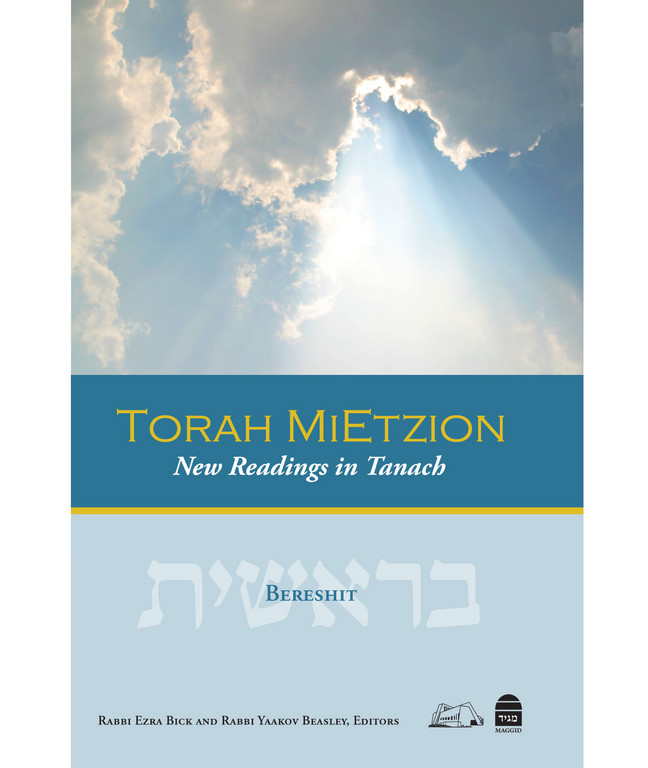Kosher Bookworm: In the beginning: The latest commentaries on Genesis
The adage that all beginnings are difficult applies equally to all human endeavors. In the world of Bible commentaries on the Book of Genesis, Bereshis, such beginnings are both literal as well as metaphoric. High quality peshat and derash are not easy to fine. This week’s review will hopefully prove that this year’s newly published works are the exception.
This week’s review will briefly touch upon several newly minted commentaries on Genesis , one an anthology of multiple authorship, and the others each of singular authorship representing, some of the finest thinking in the world of biblical scholarship today.
It will not be the purpose of this essay to evaluate in detail the content of these works, rather it will be my purpose to share with you my impressions based upon my familiarity with the previous works of these authors. In many instances much of their prior works are reflected herein.
“Torah MiEtzion: New Readings in Tanach –Bereshis” [Maggid Books / Yeshivat Har Etzion 2011] is a multi-author anthology by current and previous members of the faculty of Yeshivat Har Etzion in the Gush. This work consists of four essays for each parsha in Genesis spanning the full gamut of the historical range covered by each respective biblical narrative found within each parsha.
This sophisticated work represents the development of a very special interpretive method of commentary that reflects a rigorous interpretive mode that is both analytical as well as creative in both its presentation and freshness in approach.
Among some of the authors whose work is to be found within the pages of this work are:
Rabbi Aharon Lichtenstein, senior Rosh Yeshiva at Har Etzion; and Rabbi Menachem Leibtag, founder of the Tanach Study Center on the internet. He teaches Bible studies at Midreshet Lindenbaum, Yeshivat Sha’alvim, and Har Etzion. He is also a frequent visitor and guest lecturer in the United States, especially here in the Five Towns.
Also featured in this volume is an essay by Rabbi Mordechai Breuer, zt”l, who taught at Har Etzion for over thirty years. He was the originator of the method of biblical interpretation known as “Shitat Habechinot”. Two works of his on Genesis appeared after his passing. His commentary, in English translation, contained within this work reflects but a sampling of the greatness of his scholarship.
According to the editor of this anthology Rabbi Ezra Bick, the majority of the essays in this book were originally published in the parsha series of the Virtual Beit Midrash at :
www.vbm-torah.org perhaps the largest and most informed website of Torah learning on line today.
This work is the first volume of what is planned as a five volume series on the Chumash.
Another newly published commentary on Genesis is, “Jerusalem Stone: Insights into the Weekly Parsha From The Old City of Jerusalem” by Rabbi Avigdor Nebenzahl, who serves as Rav of the Old City of Jerusalem and is the senior Rosh Yeshiva of Netiv Aryeh. He learned b’chavrusa for many years with HaRav Shlomo Zalman Auerbach, zt’’l, and studied at both Ponovezh and Mir Yerushalayim.
According to book editor, Nechemiah Klein, this work was the result of a project that began over thirteen years ago. The Rav would give his weekly shiur in Hebrew which was then translated into English and sent on line to the yeshiva email list, world-wide.
The shiurim in this volume contained herein reflect a representation of Rabbi Nebenzahl’s scholarship and erudite manner of interpretation of the Chumash text.
Hopefully, this work will be followed by others aimed at completing the Chumash.
Lastly, I am delighted to note the publication by the Orthodox Union of ,”Echoes of Eden” [Gefen Publishing House, 2011] based upon the Me’orei Ha’aish Chumash commentary by Rabbi Ari Kahn, director of foreign student programs and senior lecturer in Jewish studies at Bar Ilan University. Rabbi Kahn also lectures at Matan, and Aish HaTorah where many of the essays in this work were first presented.
According to Rabbi Menachem Genack, general editor of the OU Press, Rabbi Kahn’s work reflects the culling of material and ideas from a wide range of sources, and interpretations many seldom cited in the more conventional studies in Chumash.
The content of each of the parsha essays by Rabbi Kahn represent a breezy, reader-friendly style of writing, while at the same time, especially through his extensive stellar footnoting, maintains a serious and most scholarly tone of learning.
This year, as with last year, Shabbos Bereshis is also Isru Chag, the day after Simchas Torah. Unlike other years, it is not a stand alone day with its distinct identity. Thus, I chose to present to you this brief series of reviews at this time, before Succos, to thus enable you to get a heads up on some of the finest Torah learning for the long winter months to come.
Chag Same’ach and keep safe.

 55.0°,
Mostly Cloudy
55.0°,
Mostly Cloudy 




